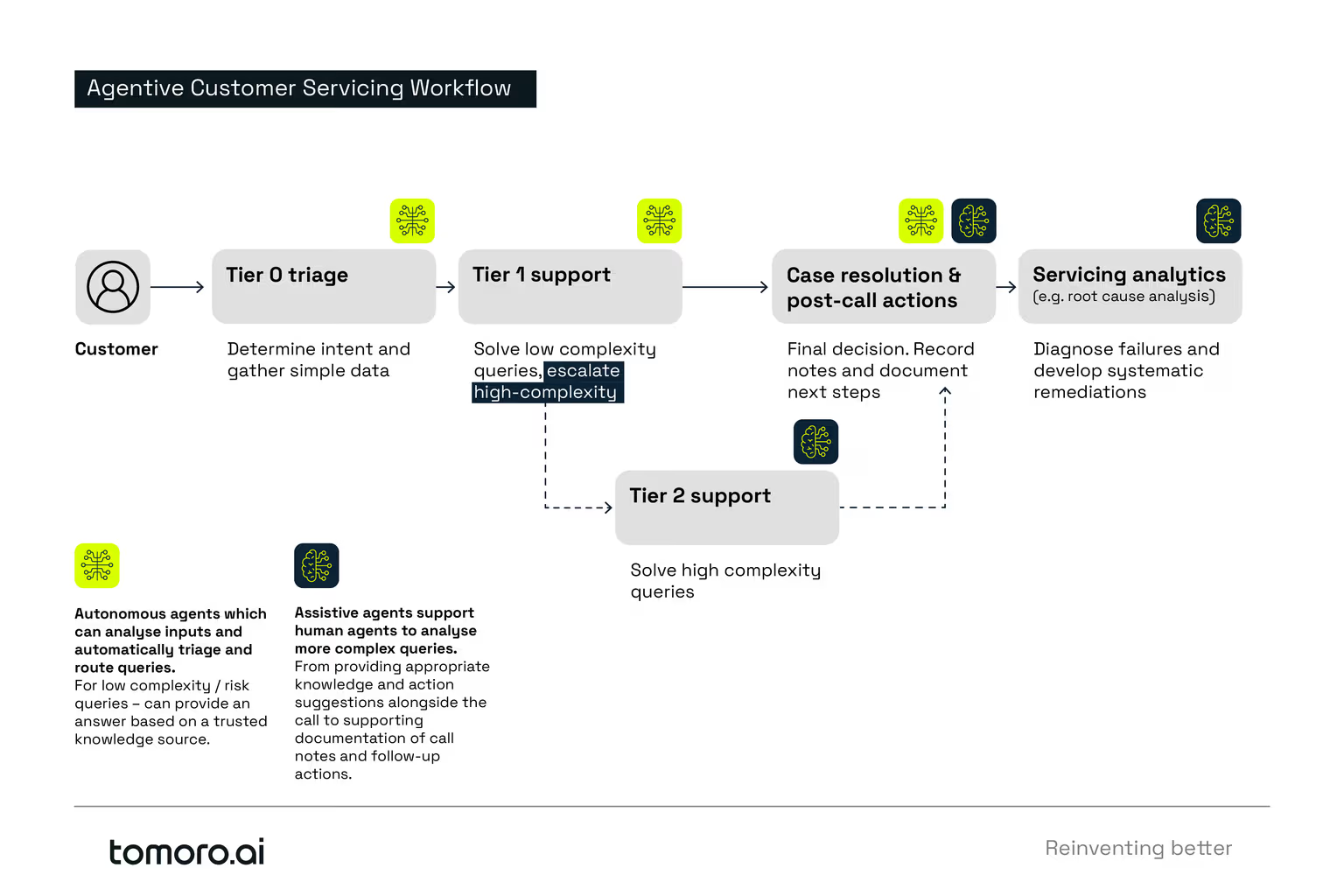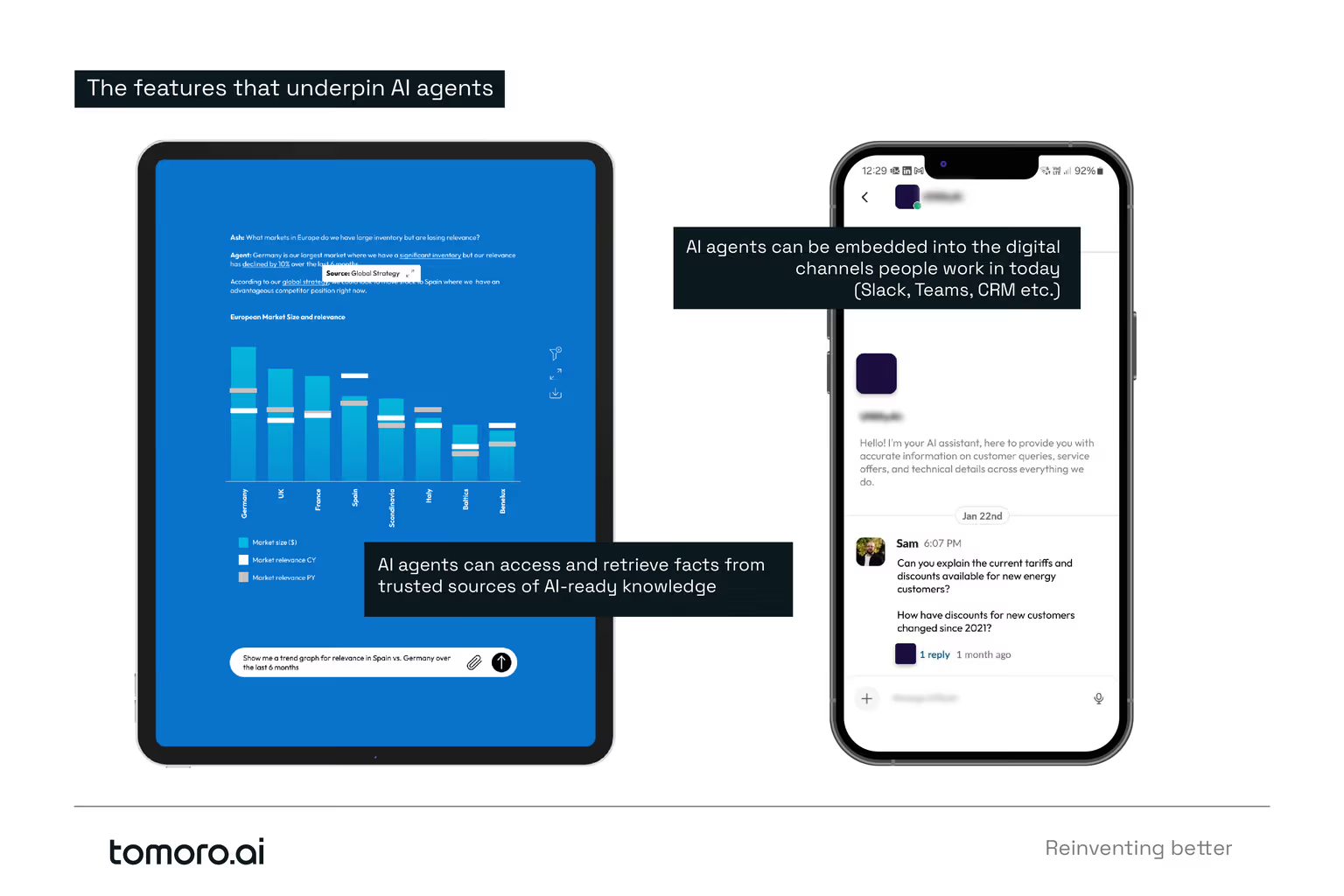A simple definition
An AI agent is an application with a defined knowledge base, the capability to initiate several actions, and the intelligence to choose the appropriate one given a specific context.
It’s designed to be self-sufficient in understanding requests, gathering the right data, making decisions and performing, or initiating, action.
But, how does that work, and what does that really mean in relation to work?
A quick example (customer servicing)
Let’s take customer service as an example. Customer service covers the end-to-end process of taking in a broad range of customer queries and serving them to completion.
For almost every large business, customer servicing is a significant cost centre where investments are constantly made to attempt to reduce run costs and/or improve customer satisfaction.
At its most generalised, most customer services follow the same core operational workflow:

Across this workflow, there are numerous opportunities for both automated and assistant-style capabilities. However, before we go much further, we should define them (in the context of customer servicing).
Automations: AI automations can analyse inputs and automatically triage and route queries without direct human intervention. For low complexity/risk queries, they can provide an answer based on a trusted knowledge source without a human touchpoint.
Assistants: AI assistants support human agents to analyse more complex queries, from providing appropriate knowledge and action suggestions alongside the call to supporting documentation of call notes and follow-up actions.
Aside - when to automate and when to assist?
Because while AI is becoming increasingly powerful, it’s not currently at the state where you’d want to trust it completely to make higher complexity decisions for your business.
In addition to the technical limitations, there are legal, ethical and customer experience considerations to think about - our way of doing business is built around skilled people operating the key facets of our work. That won’t change overnight and actually keeping human ingenuity and empathy at key parts of your workflow will become an interesting success factor over the coming years.
Back to the example - you can quickly imagine use cases for each step of this process, with a few defined here and their associated benefit profile
| Stage | Example use case(s) | Benefit metrics |
|---|---|---|
| Tier 0 triage | Automated allocation of inbound query to right servicing workflow |
|
| Tier 1 support | Automated response to simple customer queries Assistant for human agents to provide suggested next-best-action for the customer |
|
| Tier 2 support | Assistant for human agents to find information associated with a complex response more quickly, and suggest next-best-action for customer |
|
| Case resolution and post-call activity | Automated call notes and triage for each call Assistant for human agents to review auto-documented call notes and triage analysis, to approve and finalise |
|
| Servicing analytics | Assistant automated identification of customer workflow ‘hot spots’ for high volume of issues and proposed next-best-actions for engineering teams |
|
The key here is that all of these use cases are different facets of an AI agent. Each has a common set of features that can be configured to either automate away process work which is a burden to human employees today, or assist the work your people already do to make it faster, more efficient and easier for them to do a great job for your customers.
The features that underpin AI agents
-
Handle complex inputs: use LLMs to cope with messy, unstructured data entry like how we (humans) speak and text, but also how we often fill in forms or even create a database (ahem).
-
Make decisions and execute work: analyse this complex input and allocate to the right sub-process for the task at hand (e.g. this customer is asking about the status of their order, they’re not raising a complaint).
-
Use the right tools for the right job: you (definitely!) don’t need AI for every job - an AI agent can recognise, and use, the right tool for the right job (e.g. using a calculator rather than hallucinate a sum).
-
Read/write with trusted knowledge: this one is a biggie, you need to trust the AI agent can tell you the truth based on your own data - giving the agent access to the right AI-ready curated knowledge is key to most complex use cases (be that in vector, graph or structured form).
-
Operate within measurable guardrails: what you can’t measure you can’t trust - enterprise AI agents need benchmarking for accuracy and performance for their e2e workflow to enable production use cases.
-
Interact with humans and other AI agents: no agent is an island - work is still done by teams and therefore your AI agent needs to be able to communicate and ‘fit in’ to the role they are performing.

The value opportunity for businesses
These features make it possible for AI agents to create huge amounts of value for organisations and their human colleagues. For example, designing and building AI agents that excel at analysing, visualising and telling stories based on large data sets can be utilised across almost any function, job role, or knowledge work task you can imagine. We see the main categories of value today as:
-
Amplifying human capabilities
Through automation or assistant-style capabilities, AI agents can help to maximise human engagement and effectiveness. Whether assistance is in the form of overcoming human limitations, like our unreliable memories, or by automating aspects of work that simply aren’t a good use of people’s time - AI agents can offer much more than just a boost in productivity. Well-designed and integrated AI agents can improve information access, decision-making, communication, and well-being. -
Creating new value
AI agents offer enormous possibilities for organizations and people to do things that just weren’t possible before. For example, AI agents can simulate consumer perspectives in high-fidelity, meaning they’re able to role-play synthetic consumers by using existing data. This allows us to interview them, and test new ideas or even new products and features. Imagine being able to codify the thought process, decisions, actions and abilities of our highest performing people in an AI agent - making that agent widely available for others to utilise. -
Massively reducing cost
There is a huge cost burden in organisations to simply translate data between various silos, manage and maintain data quality and fill in forms for which the key data is already captured elsewhere. The automation aspects of AI agents will drastically reduce the human intervention required for a lot of this low-value, but labour-intensive, work in every large business today.
Agent-based applications of AI will get businesses to completely re-think how knowledge is managed, how work gets done and how we can liberate people to create new things. AI agents in that sense, offer us far more than text-in, text-out chatbot interactions. They offer possibilities to transform the fabric of knowledge work.


